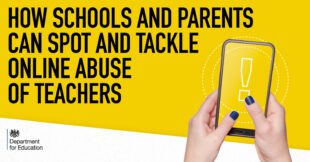Together for a better internet – Safer Internet Day 2022

Today (8 Feb) is #SaferInternetDay, organised by the joint Insafe/INHOPE network, with the support
of the European Commission.
Safer Internet Day promotes the safe and positive use of digital technology, especially among children and young people. Celebrated on the second day of the second week of the second month, each year on Safer Internet Day millions of people unite to inspire positive changes online, to raise awareness of online safety issues, and participate in events and activities right across the globe.
While we recognise that celebrations may look a little different this time around as we adapt to COVID-19 constraints, we hope that SID 2021 will still be a vibrant and engaging celebration, allowing us all to reflect on our increased use of technology as a result of the pandemic.
As always, Safer Internet Day aims to create both a safer and a better internet, where everyone is empowered to use technology responsibly, respectfully, critically and creatively.
The campaign aims to reach out to children and young people, parents and carers, teachers, educators and social workers, as well as industry, decision makers and politicians, to encourage everyone to play their part in creating a better internet.
By celebrating the positive power of the internet, the Safer Internet Day slogan of “Together for a better internet” encourages everyone to join the movement, to participate, and to make the most of the internet’s potential to bring people together.
How schools and parents can spot and tackle online abuse of teachers

24th Nov 2021: There has been coverage in the media of teachers and other school and college staff receiving abuse on social media platforms including TikTok and Instagram.
Here DfE set out the facts about what online abuse is, what schools can do to tackle it, and what we are doing to support them:
What is online abuse?
The government’s draft Online Safety Bill defines online harms as user generated content or behaviour that is illegal or could cause significant physical or psychological harm to a person.
Examples of online harms include:
- child sexual exploitation and abuse
- terrorist use of the internet
- hate crime and hate speech
- harassment, cyberbullying and online abuse
And online abuse isn’t limited to social media – it can happen over text messages or messaging apps, over email, in online chats, online games and on streaming sites.
There are different kinds of online abuse and people can be at risk of it from people they know or strangers.
We’re aware of stories in the press about teachers and staff being the victims of abuse on TikTok and have worked with the platform to make it easier for videos to be removed.
TikTok have confirmed that the best way for parents, schools and colleges to get content removed to is to report content through the Professionals Online Safety Helpline – UK Safer Internet Centre. The Professionals Online Safety Helpline has produced an article and short video on how best to report content.

Education Secretary Nadhim Zahawi said:
The online abuse of teachers that has taken place recently is simply abhorrent. It can be incredibly damaging for a teacher’s wellbeing and professional life and I am deeply concerned by the ongoing issue, which is why we have moved to make sure that TikTok do more on this trend.
Through ongoing engagement from the Department and excellent efforts from the wider sector, I am pleased to see that TikTok will be increasing funding to a helpline to support users remove harmful content from their platform more quickly.
We are clear that social media companies need to take action against harmful content on their platforms, and we are introducing laws which will bring in a new era of accountability for them.
TikTok has committed to removing content which breaches their community guidelines and people are encouraged to call the helpline on 0344 381 4772 or email [email protected].
It is never acceptable for teachers or anyone to be the subject of any kind of abuse.
All schools, colleges and other educational settings should report any online abuse, including videos, to the police.
Some incidents can result in a criminal offence being committed and it is important people are aware of the consequences of abuse and the impact it can have on an individual’s mental health.
But what about other social media platforms?
We have been clear that social media companies need to take immediate action against harmful content, towards anyone, on their platforms.
Other social media platforms have their own guidance on how to report abuse including: Facebook and Instagram, Snapchat and Twitter.
Get Safe Online also provides important information and advice on where people can get further help and information such as the National Bullying Helpline.
Harmful content can also be reported to ‘Submit a Report of Harmful Content’.
What are we doing to combat online abuse towards teachers and staff?
We know many settings and institutions are already talking to pupils and students about these issues and we fully support schools and colleges in taking appropriate action against pupils and students who are identified as posting abusive content.
Our keeping children safe in education (KCSIE) statutory safeguarding guidance provides all school and college staff with information about different types of abuse and harm, including online abuse. KCSIE was most recently updated on 1 September and among other things now gives online safety the prominence it rightly deserves.
The guidance is very clear that:
- All staff should have safeguarding and child protection training (including online safety) at induction, with training being regularly updated.
- Schools and colleges should ensure that appropriate filtering and monitoring systems are in place.
- Schools and colleges have a clear policy on the use of mobile technology, which amongst other things reflects that many children have unrestricted access to the internet via smart devices.
KCSIE also includes information and tools that schools and colleges can use to help keep children safe online; this includes a dedicated collection of resources to support them in signposting parents and carers to help them keep their children safe from different risks online.
Many parents may feel concerned about the activities and content their children are accessing and that’s why we published guidance on “Teaching online safety in schools”. It outlines how schools can ensure their pupils understand how to say safe and behave online.
Also, through the introduction of compulsory Relationships, Sex and Health Education (RSHE), pupils are taught about online relationships, the implications of sharing private or personal data (including images) online, harmful content, cyberbullying and where to get help and support.
We also continue to work with social media companies, trade unions, the Children’s Commissioner, and interested parties to protect teachers from online abuse.
Is there any support for parents?
The following resources provide guidance for parents and carers to keep children safe online. They will, amongst other things, support parents to talk to their children about a range of online safety issues, set up home filtering in a child-friendly way and set up age-appropriate parental controls on digital devices:
Thinkuknow by the National Crime Agency – Child Exploitation and Online Protection command (NCA-CEOP) provides resources for parents and carers and children of all ages to help keep children safe online.
Childnet has developed guidance for parents and carers to begin a conversation about online safety, as well as guidance on keeping under-fives safe online.
Parent Info is a collaboration between Parent Zone and NCA-CEOP, providing support and guidance for parents and carers related to the digital world from leading experts and organisations.
National Society for the Prevention of Cruelty to Children (NSPCC) has guidance for parents and carers to help keep children safe online.
UK Safer Internet Centre provides tips and advice for parents and carers to keep children safe online – you can also report any harmful content found online through the UK Safer Internet Centre.
Sector Response
Commenting on Safer Internet Day (Tues 8 Feb), Paul Whiteman, general secretary of school leaders’ union NAHT, said:
“The internet is a powerful tool for connecting to each other and for learning and, given the impact of the pandemic, we are very grateful to have it. Life over the past two years would have been very different without it. But we do still need to be mindful of the risks – especially as children are spending more time than ever on screens and internet-enabled devices.
“This Safer Internet Day, we welcome the celebration of the role children and young people can take in creating a safer internet. They want to enjoy gaming and interacting with their friends online. But with the lack of respect individuals can display towards each other, those experiences can be challenging or harmful. It is vital that children and young people understand what respectful behaviour online looks like and that they know what to do if they encounter hate or bullying directed at them or someone else.
“Schools and parents obviously have their role to play in this too. And the government must also do more to establish a national strategy, education programme and effective legislation in order to safeguard young people online.”
Commenting ahead of Safer Internet Day on Tuesday 8 February, Rosamund McNeil, Assistant General Secretary of the National Education Union, said:
“The National Education Union is proud to support Safer Internet Day to promote the safe, responsible and positive use of digital technology for children and young people.
“The internet can and does have a positive effect on young people’s lives but we must also recognise the harms. We know that young people have spent more time playing online games and apps during the pandemic than ever before. It is important that children and young people are equipped with the skills and strategies to spot and speak out against harmful and misleading content online.
“We welcome this year’s theme of exploring respect and relationships online. Respect and relationships play a key part in the work we are doing to challenge sexism in schools and so we welcome the chance to focus on this and to celebrate young people’s role in creating a safer internet.”
Commenting on the announcement by Digital Minister Chris Philip that the Online Safety Bill will be strengthened to better protect children from online pornography, Geoff Barton, General Secretary of the Association of School and College Leaders, said:
“We welcome this strengthening of the Online Safety Bill. Children must be able to grow up in a society where pornography is not available at the touch of a button.
“Sadly, it is so readily accessible that it has become a normalised part of adolescence. The distorted perceptions that it creates have undoubtedly contributed to the reprehensible climate of abuse and harassment that was clear from the harrowing testimonies on the Everyone’s Invited website.
“We simply cannot go on like this and the strengthened Online Safety Bill is a step in the right direction. The frustration is that it has taken an eternity to reach this point.”











Responses